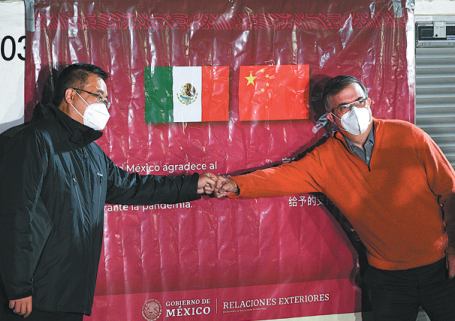Chinese jabs turning the tide

Hard-hit Latin America buoyed by brisk pace of vital shipments
The quickening pace of arrivals of Chinese-developed COVID-19 vaccines in many Latin American countries underscores China's commitment to creating a safer global community by getting affordable vaccines to developing and less-well-off nations, officials and business leaders said.
With recent shipments to Uruguay, Bolivia, Chile and Argentina, the vaccines developed by Sinovac Biotech and China National Pharmaceutical Group, or Sinopharm, are helping countries in the region kick off or bolster mass-immunization programs. The arrival of the Chinese vaccines comes amid difficulties some countries have faced in procuring Western-made shots.
"China undoubtedly has taken an important leap in health and cooperation in the fight against diseases and epidemics, a space that it will surely maintain and deepen over time, considering the likely recurrence of new pandemics in the future," Juan Pablo Glasinovic, an international relations expert and manager of the Chilean-Peruvian Chamber of Commerce, said in Santiago.
Uruguay acquired its first batch of a Chinese-developed COVID-19 vaccine on Thursday. Wang Gang, China's ambassador to Uruguay, said at a news conference the following day that the arrival of the doses of the Sinovac vaccine constituted a great event in the history of bilateral relations.
Uruguay is set to start its immunization campaign using the vaccine, which is called CoronaVac.
"Relations between our country and China have been rated as excellent on various occasions," Fatima Fierro, executive director at the Uruguay-China Chamber of Commerce, said in Montevideo, Uruguay's capital. "The ties are strong and friendly."
Chile, on the other side of South America, is winning accolades for the speed with which it is vaccinating its population. By Friday, more than 3.2 million of the country's 19 million people had received jabs against COVID-19.
With an average of 200,000 people getting vaccinated each day, Chile aims to immunize 5 million by the end of the first quarter of the year.
"It is a very challenging goal, a very difficult goal, but today we are seeing that we are going to be capable of reaching that goal," said Paula Daza, Chile's undersecretary of public health.
Three shipments of CoronaVac have arrived in the country. "Chinese vaccines are the backbone of the vaccination process in Chile," Glasinovic said.
Lorena Bustos, a director of Lab-Com, a healthcare public relations firm in Santiago, said the key to Chile's success has been diversification of its portfolio of vaccines.
"One of the characteristics in terms of providing the population with the vaccine, as part of the Chilean strategy against COVID-19, was to diversify the purchase of the different vaccines in the market," Bustos said.
In Mexico, a second batch of CoronaVac arrived on Saturday, the health ministry said.
Mexican Foreign Minister Marcelo Ebrard thanked China for providing the vaccine and said it is helping the government push ahead with vaccinations. China is "fulfilling the commitment to support Mexico," Ebrard said.
Globally, more than 114 million cases of COVID-19 have been confirmed since the start of the pandemic. According to Johns Hopkins University, the death toll stands at over 2.5 million, and Latin America accounts for a large proportion of the fatalities.
In hard-hit Bolivia, hopes are high for the Sinopharm vaccine, with 500,000 doses arriving on Wednesday.
"When we took office last November, our first goal was to regain health for Bolivians. We bought millions of nasal antigen tests, tons of drugs and now we have the vaccines to continue immunization," Bolivian President Luis Arce said at an airport in Santa Cruz, where he was on hand for the arrival of the vaccine.
Juan Pablo Suarez, vice-president of an association of economists of Santa Cruz, said that ensuring the health of Bolivians is key to getting the economy moving again.
"The arrival of the vaccines from China, Russia, the US and the UK will start to unlock the country's economy," Suarez said.
In Argentina, the government of President Alberto Fernandez took possession of the first batch of 904,000 doses of the Sinopharm vaccine.
"We thank the Chinese government," said Foreign Minister Felipe Sola.
With the global rush to get a vaccine, the World Health Organization estimates that less than 10 percent of the world population have antibodies to the coronavirus, according to Russian news agency Sputnik.

The writer is a freelance journalist for China Daily.





















